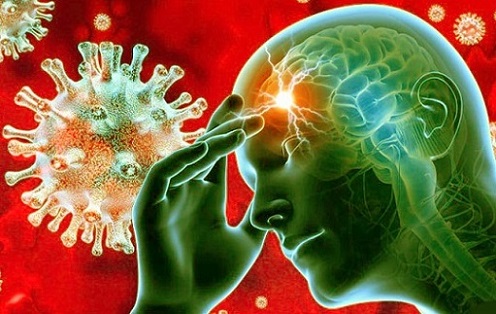Nikhil Prasad Fact checked by:Thailand Medical News Team Jul 25, 2024 9 months, 2 weeks, 19 hours, 51 minutes ago
Medical News: A recent murine study has unveiled alarming findings about how COVID-19 heightens the risk of stroke. This
Medical News report delves into the research led by scientists from Mercer University-Georgia-USA and South University, Georgia-USA, demonstrating the critical impact of the SARS-CoV-2 spike protein on cerebrovascular complications. The study's comprehensive analysis reveals a significant increase in stroke risk and cognitive impairments due to the virus's interaction with the renin-angiotensin-aldosterone system (RAAS).
 Murine study shows how COVID-19 increases risk for stroke
The Connection Between COVID-19 and Stroke
Murine study shows how COVID-19 increases risk for stroke
The Connection Between COVID-19 and Stroke
COVID-19, caused by the SARS-CoV-2 virus, has been primarily known for its respiratory complications. However, neurological symptoms, including stroke, have increasingly come to light. The study posits that the SARS-CoV-2 spike protein exacerbates stroke and cerebrovascular complications by disrupting RAAS balance, increasing coagulation, and decreasing fibrinolysis. This imbalance leads to severe inflammation and hypercoagulation, significantly impacting brain function and overall health.
Study Methodology and Findings
The research utilized a humanized ACE2 mouse model to mimic human infection and its effects on cerebrovascular health. The mice were injected with the SARS-CoV-2 spike protein, followed by a thromboembolic stroke model induced using ferric chloride (FeCl3). This setup allowed the researchers to closely monitor changes in cerebral blood flow, infarct size, and cognitive function.
The findings were stark. Mice exposed to the spike protein showed a marked decrease in cerebral blood flow and an increase in neuronal death. Additionally, there was a significant decline in cognitive function, assessed through the Novel Object Recognition test. The study also measured tissue factor-III and plasminogen activator inhibitor-1 using immunoblotting to evaluate coagulation and fibrinolysis, respectively.
Detailed Insights from the Study
-RAAS Imbalance and Inflammation: The SARS-CoV-2 spike protein significantly disrupted RAAS balance, leading to increased activation of the angiotensin II type 1 receptor (AT1R) and decreased expression of the angiotensin II type 2 receptor (AT2R) and the MAS receptor. This imbalance heightened brain inflammation, as evidenced by increased expression of pro-inflammatory markers such as NFκB, TNF-α, Il-1β, and Il-6.
-Hypercoagulation and Decreased Fibrinolysis: The spike protein intensified the expression of tissue factor III (TF-III) and plasminogen activator inhibitor-1 (PAI-1), which are critical in promoting coagulation and inhibiting fibrinolysis. This disruption favored clot formation and impeded clot breakdown, leading to more severe thromboembolic events.
-Cerebral Blood Flow and Infarct Size: The mice treated with the spike protein showed a significant reduction in cerebral blood flow, with prolonged
recanalization times after stroke. This reduction was linked to larger infarct sizes, indicating more extensive brain damage.
-Cognitive Impairments: The study's cognitive assessments revealed that the spike protein significantly impaired memory and learning functions in the mice. These impairments were notably reduced with Losartan treatment, highlighting the potential for therapeutic interventions targeting RAAS imbalance.
The Role of Losartan
Interestingly, the study also explored the potential therapeutic effects of Losartan, an angiotensin receptor blocker (AT1R). When administered to the mice immediately after spike protein injection, Losartan restored RAAS balance and reduced the spike protein-induced effects. This treatment led to improved cerebral blood flow, reduced neuronal death, and better cognitive function.
Implications and Future Directions
The implications of these findings are profound. They suggest that COVID-19's impact extends far beyond respiratory symptoms, contributing to severe neurological complications like stroke. The study underscores the need for further research into therapeutic strategies that can mitigate these effects, with Losartan presenting a promising option.
Additionally, the study highlights the importance of understanding the molecular mechanisms behind COVID-19-induced hypercoagulopathies and impaired fibrinolysis. This knowledge could lead to the development of targeted treatments that not only address the immediate symptoms of COVID-19 but also its long-term complications.
The study findings have provided crucial insights into how COVID-19 increases the risk of stroke, paving the way for more effective treatments and preventive measures. Their findings stress the importance of continued vigilance and innovation in managing the broad spectrum of complications associated with COVID-19.
Conclusion
This murine study offers a detailed look at how the SARS-CoV-2 spike protein exacerbates stroke risk by disrupting RAAS balance, increasing coagulation, and decreasing fibrinolysis. The findings highlight the potential of Losartan to counteract these effects and improve outcomes for individuals affected by COVID-19.
The study findings were published on a preprint server and is currently being peer reviewed.
https://www.researchsquare.com/article/rs-4649614/v1
For the latest
COVID-19 News, keep on logging to Thailand
Medical News.
Read Also:
https://www.thailandmedical.news/news/gut-health-and-inflammation-are-also-risk-factors-for-stroke
https://www.thailandmedical.news/news/body-water-balance-a-key-to-recovery-in-stroke-patients
https://www.thailandmedical.news/news/cerebral-microbleeds-increases-risk-of-stroke-or-dementia
